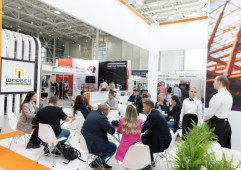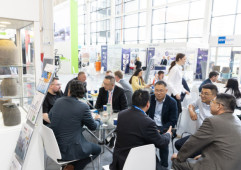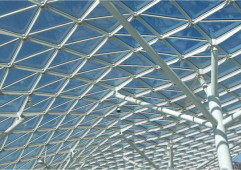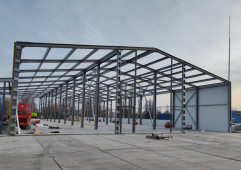MMK Group Trading Update for Q1 2020
PJSC Magnitogorsk Iron & Steel Works ("MMK", or "the Company") (MICEX-RTS: MAGN; LSE: MMK), one of the world's largest steel producers, a Metal-Expo regular exhibitor, announces its operational results for Q1 2020.
Q1 2020 IN COMPARISON TO Q4 2019
- Pig iron output decreased by 9.6% quarter-on-quarter (q-o-q) and amounted to 2,355 thousand tonnes amid the suspension of blast furnace №2 production due to a capital overhaul in February. The overhaul will allow to improve environmental performance through constructing dust exhausting units at casting house and stock house.
- Steel output was down by 1.6% q-o-q and amounted to 3,022 thousand tonnes due to maintenance work at converter facilities and scheduled reconstruction of hot rolled Mill 2500.
- MMK Group’s total sales of finished products totalled 2,745 thousand tonnes, down 1.3% q-o-q.
- MMK Group’s sale of HVA products amounted to 1,308 thousand tonnes, up 1.0% q-o-q. The share of HVA products in total sales amounted to 47.7%. This growth was due to higher demand for coated metal products.
- MMK Coal’s coal concentrate production totalled 814 thousand tonnes, up 12.9% q-o-q due to higher demand for concentrate at MMK.
Q1 2020 IN COMPARISON TO Q1 2019
- Pig iron output decreased by 1.7% year-on-year (y-o-y) amid longer maintenance work scheduled at blast furnace facilities compared to the previous year.
- Steel output was down by 2.7% y-o-y due to lower steel demand amid scheduled maintenance work at rolling facilities.
- MMK Group’s total sales of finished products declined by 1.3% y-o-y.
- MMK Group’s sale of HVA products declined by 2.5% y-o-y. The share of HVA products in total sales was down to 47.7%.
- MMK Coal’s coal concentrate production increased by 4.8% y-o-y
MARKET OVERVIEW
Following the partial recovery of global prices for rolled metal products at the end of Q4 2019, the global market conditions sharply deteriorated in mid-Q1 2020 due to widespread quarantine measures and weaker economic activity amid the coronavirus pandemic outbreak.
In the beginning of Q1 2020, price dynamics on the Russian market reflected the global quotes growth initiated in Q4 2019. At the end of Q1 2020, prices for rolled metal products were supported by a significant rouble devaluation.
Global iron ore market: in Q1 2020, iron ore quotes were high and ranged from $80-90/tonne CFR China. Despite the active development of the coronavirus pandemic, the blast furnace capacity utilization in China was nearly the same as in early 2019 - demand and end consumption of iron ore was stable. In addition, high prices were also a result of a weak supply at the global iron ore market. Shipments from Brazil were quite low during almost all of Q1 2020 due to heavy rain season. At the end of the quarter a number of other countries such as South Africa, India, and others decreased iron ore exports due to restrictions aimed at preventing the spread of coronavirus.
Russian iron ore market: at the beginning of Q1 2020 iron ore exports to EU countries increased. In April 2020 the pace of exports declined sharply, following the pandemic outbreak in Europe. Russian iron ore suppliers redirect export volumes to China amid phased economic recovery in the region. However, the challenging situation for metal producers around the world and logistic issues of iron ore exports from Russia may have a negative impact on the sales volumes of Russian suppliers. Base prices in Russia are following Chinese indices adjusted for changes in USD/RUB rate.
Global coking coal market: in January-February, quotes demonstrated growth due to high sales volumes in China. However, in March, demand from China declined as the local mining volumes resumed to normal levels, while a sharp decline in capacity utilisation at metal facilities in the EU, US, India and other countries started to accelerate on the back of pandemic. As a result, all unclaimed volumes were redirected to China, leading to spot prices declining by $20-25/tonne within the month.
Russian coking coal market: the volume of raw materials supply in Russia continue to exceed demand; exports slightly increased in Q1 2020 prior to the pandemic, but external demand is quite limited in the current environment. While Russian coal producers have started to reduce mining rates, this has not significantly affected the market balance so far. Prices in Russia slightly declined in Q1 2020, following a sharp decline throughout the whole of 2019, however they are remained flat in Q2 as prices in Russia are already close to cash costs levels for many coal companies.
Russian metal scrap market: the increase in scrap prices in Russia in early 2020, which occurred amid a period of low scrap collection dynamics, supported the supply volume. However, starting from February 2020, steel companies have been reducing purchasing prices, due to lower exports quotes for scrap. At the end of Q1 2020, prices continued to drop amid potential decline in capacity utilisation of steel companies due to unfavourable macroeconomic conditions.
OUTLOOK
The unfavourable pandemic environment globally and the introduction of quarantine measures in Russia to fight coronavirus create uncertainty in terms of demand for metal products from key consuming industries. As a result, the Company’s management sees risks of declining sales volumes in Q2 2020. During the peak period of the coronavirus outbreak and weaker business activity, the Company has been conducting maintenance work leading to a planned decline in production volumes.
Market uncertainty and reduced business activity amid the coronavirus pandemic will significantly affect global prices for metal products in Q2 2020.
Due to the rouble devaluation in March, in Q2 2020 iron ore prices are expected to stay the same, with a moderate correction towards the end of the quarter. Prices for coal concentrate in Russia should remain at the current levels, since indices are close to cash costs for a number of coal companies. Prices for metal scrap will decline in Q2, reflecting the negative impact of the pandemic on business activity.
The Company continues to closely monitor the coronavirus situation. Active measures taken by the Company’s management to avoid the spread of the virus are helping to minimise risks both for its employees and the business.
Improving operational efficiency is one of the main priorities of the Company as it works to support its financial performance despite economic headwinds.



